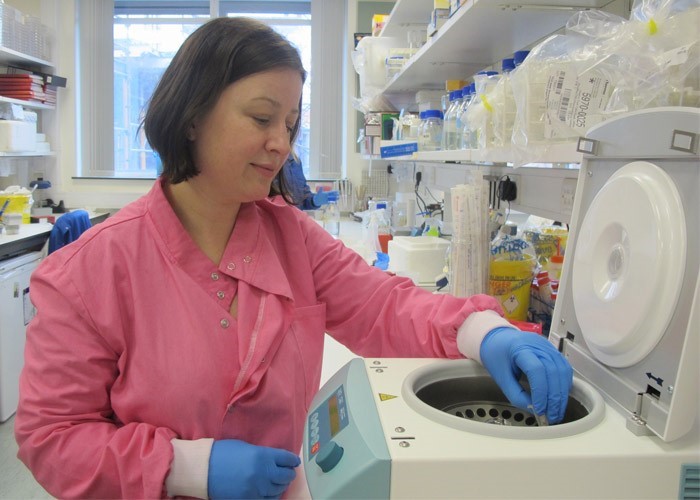We hear from Dr Niamh Buckley, a Breast Cancer Now Fellow based at Queen’s University Belfast. She shares how she has been working from home after her lab closed due to COVID-19.
We hear from Dr Niamh Buckley, a Breast Cancer Now Fellow based at Queen’s University Belfast. She shares how she has been working from home after her lab closed due to COVID-19.

Dr Niamh Buckley is a Breast Cancer Now Fellow, based at Queen’s University Belfast. She is studying triple negative breast cancer to find better ways to treat it. After her lab had to close at the end of March due to COVID-19, Niamh continued carrying out her research working from home. We caught up with her to hear more.
What is your research about?
My research is focused on understanding what drives triple negative breast cancers. They’re not all the same. We’re trying to work out distinct types of triple negative breast cancers and then use that knowledge to tailor treatment.
If we understand what drives these breast cancers, we can give patients the treatment that is going to work and spare them from experiencing unnecessary side effects of treatments that won’t work. Overall, it would make treatment more effective, hopefully kinder, and could prevent people from dying from the disease.
How has your research been affected by the COVID-19 pandemic?
My research lab was closed on 20 March. We haven’t been able to go back into the lab since then and it has taken some time to adjust.
Since then, schools have closed as well. My husband is also a scientist who works at a local pharmaceutical company and still has to go to work. So I’ve been at home with the kids. In the morning, I try to do homeschooling and give them a bit of attention, but at lunch I try to switch over to work. It’s not easy to balance everything, but generally it has worked quite well.
Now, we’re starting to think about how we could go back to work in the lab. Most universities are trying to put some plans in place. We’re trying to work out if we would be working in shifts, whether to implement one-way systems around the lab and other safety measures that would be needed when labs reopen.
How are you continuing your research from home while labs remain closed?
I’ve been trying to utilise some of the online resources that are available for breast cancer research.
There’s a huge wealth of patient data available for research. I already use it in my work quite a bit, but now I’m trying to do more, maybe trying to link some observations together. It has given us a little bit of time to take a step back and join some dots that we didn’t look for before.
We’re looking whether there are particular genes or processes in cancer cells that are associated with a better or worse response to current treatments. People with triple negative breast cancer usually receive chemotherapy. Some of them do well, but this treatment doesn’t work for everyone. So we’re trying to understand the cancer biology that is driving these differences. And this is where public data and online resources are very useful, because looking at large numbers of patients we can start noticing trends.
We’re doing all these analyses now so that when we get back into the lab we’ll be ready to go and test some ideas.
What could we learn from the COVID-19 crisis and bring to breast cancer research?
I think it just shows how adaptive and how flexible we can be. If you asked me before, I would tell anyone I can’t work from home. But now I’m doing it. Sometimes we have to look at things from a different angle. Just because it’s not what we’re used to, it doesn’t mean it’s wrong. So I think we’ve learnt that we can do things a different way and still achieve something.
There have definitely been more challenges, but to a certain extent it has given us a bit of time to stop and take stock of where our research is and what we’re trying to achieve. It’s maybe letting us start things from a new angle that we wouldn’t have noticed before.
Why is it so important that breast cancer research continues?
The coronavirus outbreak has had so much impact on our lives, but for people with breast cancer it will have been even more difficult. There have been changes to people’s treatments, appointments and follow-up care, as well as to the screening programme in some parts of the UK.
Breast cancer has not stopped because of coronavirus. So we really have to keep research going to get the best treatment and the best understanding of the disease for the future.
Do you have a message for Breast Cancer Now supporters?
Thank you to all the support they have given so far. We wouldn’t be able to do the research and achieve all the things that we have done without their support. But we need them to continue to support us so that we can keep moving forward.
As I said, coronavirus hasn’t stopped breast cancer from happening, so we need to do all we can to make sure it doesn’t stop research progress either.
Dr Niamh Buckley’s Fellowship is made possible by the generous support of Asda Tickled Pink.
We need your support, now more than ever, so that our researchers can make up for lost time.